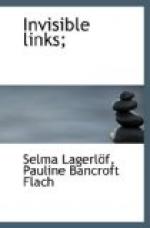The mistress of the house lost no time in setting Ruster to work. “You hear, I suppose,” she said, “that Liljekrona does nothing but play all the evening, and I must attend to setting the table and the food. The children are quite forsaken. You must look after these two smallest.”
Children were the kind of people with whom little Ruster had had least intercourse. He had met them neither in the bachelor’s wing nor in the campaign tent, neither in wayside inns nor on the highways. He was almost shy of them, and did not know what he ought to say that was fine enough for them.
He took out his flute and taught them how to finger the stops and holes. There was one of four years and one of six. They had a lesson on the flute and were deeply interested in it. “This is A,” he said, “and this is C,” and then he blew the notes. Then the young people wished to know what kind of an A and C it was that was to be played.
Ruster took out his score and made a few notes.
“No,” they said, “that is not right.” And they ran away for an A B C book.
Little Ruster began to hear their alphabet. They knew it and they did not know it. What they knew was not very much. Ruster grew eager; he lifted the little boys up, each on one of his knees, and began to teach them. Liljekrona’s wife went out and in and listened quite in amazement. It sounded like a game, and the children were laughing the whole time, but they learned.
Ruster kept on for a while, but he was absent from what he was doing. He was turning over the old thoughts from out in the storm. It was good and pleasant, but nevertheless it was the end of him. He was worn .out. He ought to be thrown away. And all of a sudden he put his hands before his face and began to weep.
Liljekrona’s wife came quickly up to him.
“Ruster,” she said, “I can understand that you think that all is over for you. You cannot make a living with your music, and you are destroying yourself with brandy. But it is not the end, Ruster.”
“Yes,” sobbed the little flute-player.
“Do you see that to sit as to-night with the children, that would be something for you? If you would teach children to read and write, you would be welcomed everywhere. That is no less important an instrument on which to play, Ruster, than flute and violin. Look at them, Ruster!”
She placed the two children in front of him, and he looked up, blinking as if he had looked at the sun. It seemed as if his little, blurred eyes could not meet those of the children, which were big, clear and innocent.
“Look at them, Ruster!” repeated Liljekrona’s wife.
“I dare not,” said Ruster, for it was like a purgatory to look through the beautiful child eyes to the unspotted beauty of their souls.
Liljekrona’s wife laughed loud and joyously. “Then you must accustom yourself to them, Ruster. You can stay in my house as schoolmaster this year.”




